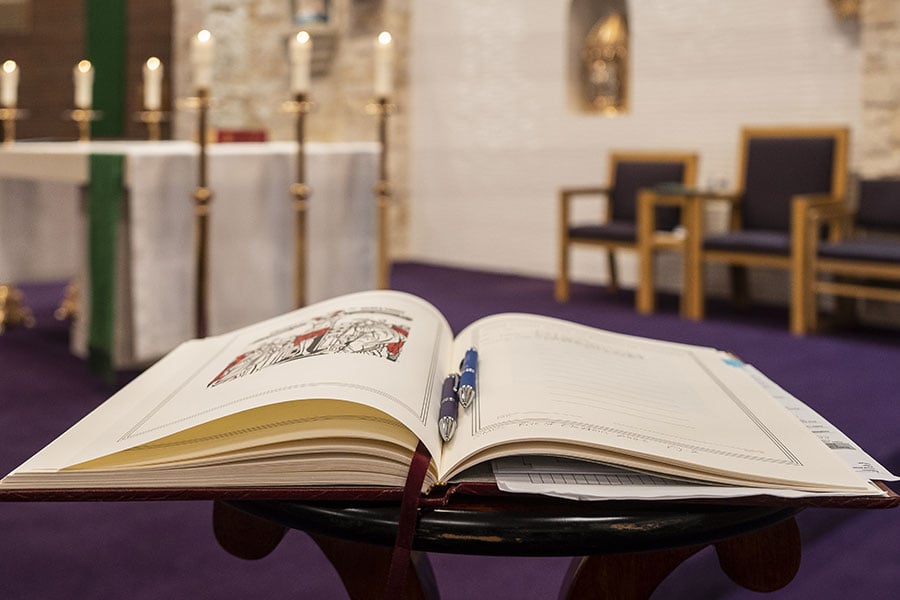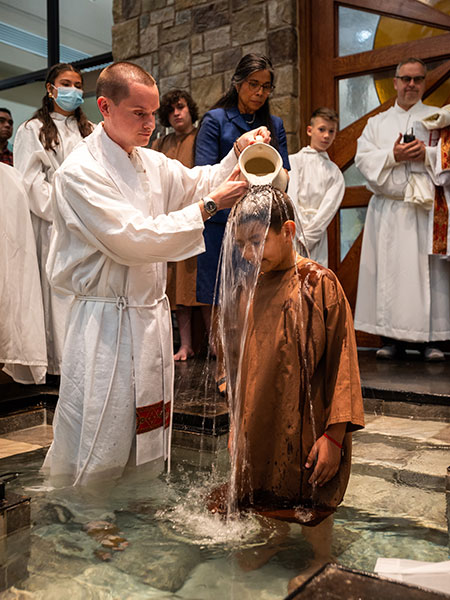Joining the world’s biggest family

The Book of the Elect at St. Michael Church in Bedford February 18, 2023. (NTC/Juan Guajardo)
PHOTO GALLERY FROM RITE OF ELECTION
Every year, the Diocese of Fort Worth welcomes hundreds of new Catholics into the Church family during the Saturday night Easter Vigil Mass. This year, the diocese will welcome 297 candidates and 452 catechumens who have spent a year or more preparing for this night through the Rite of Christian Initiation of Adults (RCIA).
“They’re being invited into the biggest family on the planet,” said Tammy Sandoval, director of faith formation at St. Francis of Assisi Parish in Grapevine. “The Easter Vigil is my favorite Mass because of all of these graces being poured out in the sacraments of initiation.”
Preparing candidates (non-Catholics who were baptized in another religion) and catechumens (those who have not been baptized) to receive the sacraments of initiation begins long before the Easter Vigil.
Sandoval said her RCIA team of eight meets during the summer to plan for the following year, determine who will teach which lessons, and make course improvements based on surveys from the previous year. At St. Francis, as in most parishes, deacons and priests also teach various lessons. The two-hour weekly meetings include a lesson, small group discussion, and question/answer time.
“We ask them, ‘What do you think about this? What doesn’t make sense? Let’s talk about what makes no sense at all,’” Sandoval said. “We’re reminded when we teach how beautiful the liturgy is and why everything has a purpose and meaning.”

Robin Harris, director of faith formation at St. Michael Parish in Bedford, said the RCIA curriculum is “intentional and systematic.”
“It’s not just a set of topics,” she said. “We tie it to the liturgy. We open up Scripture and open up [Church] Tradition.”
“If you approach the RCIA as just a topic … then you have completely lost the ability to help draw somebody into the loving God in His Church,” she added.
St. Michael’s 16 volunteers and staff work with various aspects of formation, from teaching a full lesson to breaking open the Word with catechumens during the dismissal at Sunday Masses.
“The most important thing about the RCIA is that it is rooted in sacred Scripture, sacred Tradition, and tied to the Holy Mass,” Harris explained.
Bryan Whitt, a St. Michael RCIA team member, is a new Catholic who journeyed through RCIA last year.
“Last year, I was being led,” Whitt said. “This year, I led a ‘Breaking Open the Word’ session and helped facilitate small group discussion.”
Whitt’s journey to the Easter Vigil began in 2004 when he joined the coaching staff at University of Texas at Dallas as a tennis coach and over the years became friends with other coaches there who are Catholic. After a probing lunchtime conversation about Catholicism, the baseball coach, Shane Shewmake, took him across the street to a Catholic bookstore for a copy of Why We’re Catholic by Trent Horn. Whitt finished reading it before returning to work the next day. He found St. Michael’s RCIA; Shewmake became his sponsor; and his entire work team came to the Easter Vigil.
He said RCIA was “a consistent source of information and in-depth knowledge … we had deacons and priests coming in to teach and bringing up subjects I never thought about.
“It wasn’t just sign up and get a T-shirt,” he added. “There is a whole process and I’m glad there was.”
Four phases
Diocesan Director of Evangelization and Catechesis Jason Whitehead said the RCIA process includes an “intentional pattern” of four phases that come directly from the Holy See.
“Each of those periods are unique and distinct unto themselves,” he said.
During the initial phase, Evangelization and Pre-catechumenate, the goal is to introduce people to the Gospel of Jesus Christ.
“After one becomes an intentional disciple — a follower of Jesus on purpose — then one is equipped and disposed to receive catechesis” during the second and longest phase — the Catechumenate, Whitehead explained.
On completing the catechetical phase, participants are prepared for the “internal reflection” needed during Purification and Enlightenment, which takes place during Lent. Whitehead noted that the entire congregation parallels the RCIA journey because parishioners also seek purification during Lent, and they renew their baptismal promises at Easter.
“The Easter Vigil is the transition from Purification to Mystagogy, which means walking in the mysteries or walking in the sacraments,” Whitehead said. “It’s all about formation in the context of now living out the supernatural life you have, in light of the sanctifying grace you received from the sacraments.”
Along with weekly lessons, diocesan RCIA teams also strive to develop supportive relationships with each candidate and catechumen.
“We learn the art of accompaniment,” Sandoval said. “The Church asks us to be humble and allow ourselves to be touched by everyone with compassion and respect. We are all working together to deepen our faith.
“They are journeying to make a decision about going deeper with Christ,” Sandoval added, “and we are on this catechetical journey ourselves, going deeper.”
Walking with souls
Samantha Wall, parishioner of St. Elizabeth Ann Seton Church in Keller, credits God’s guidance, her sponsor, and her parish RCIA team for strengthening her spiritual journey. She said the team profoundly deepened her understanding of Mary and the Rosary.

“You can pray those prayers that you say over and over, and your mind can go to Christ or to the Trinity,” she said. “Your mind can be elevated to God.”
Wall had been an atheist for about 10 years, beginning in her teens, until she realized “this can’t be all there is.”
“Somehow, I ran into the fact that God was real, and that Jesus was Christ. So, if Christ is real and Christianity is real, I should probably find a church,” she recalled.
She said the team answered any and all questions, but most importantly, “they told the truth in a kind and loving manner.”
“They didn’t try to water it down to make it nice to hear. They said, ‘This is the Catholic faith. If you can accept these things about the Church, then you can be Catholic. If you cannot, then hold off until you are 100 percent sure.’”
Wall, who came into the Church two years ago, is now on her parish RCIA team and serves as a sponsor. She said RCIA needs more sponsors because “the one-on-one [attention] is so important. It’s not just about getting answers. It’s also about developing a relationship.”
Whitehead observed that some people make sacrifices to become Catholic because they have strong ties to another religion.
“Sometimes people are leaving a former life behind and that can be exceedingly difficult, especially if they come from an anti-Catholic past. So, their need for spiritual, emotional, and human support only increases. This is where the catechists, sponsors, godparents, RCIA directors, and priests are key.”
Whitehead knows from personal experience that the road to becoming Catholic can be “rocky.” In 2003, he quietly resigned from Baptist ministry after studying the works of the Church Fathers and realizing that “the version of Christianity I’d been living knows no place in the early Church. The disciples of the disciples were as Catholic as anything.
“Liturgy and catechesis are essential, but we also have to keep in mind that we are dealing with souls, and attention must be given to whatever pain and struggles they are experiencing in this journey,” he added.
